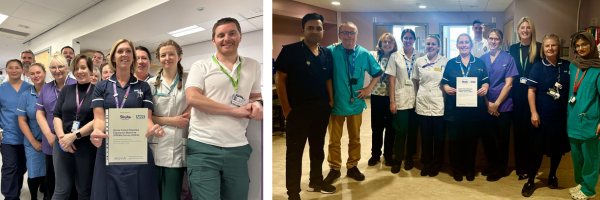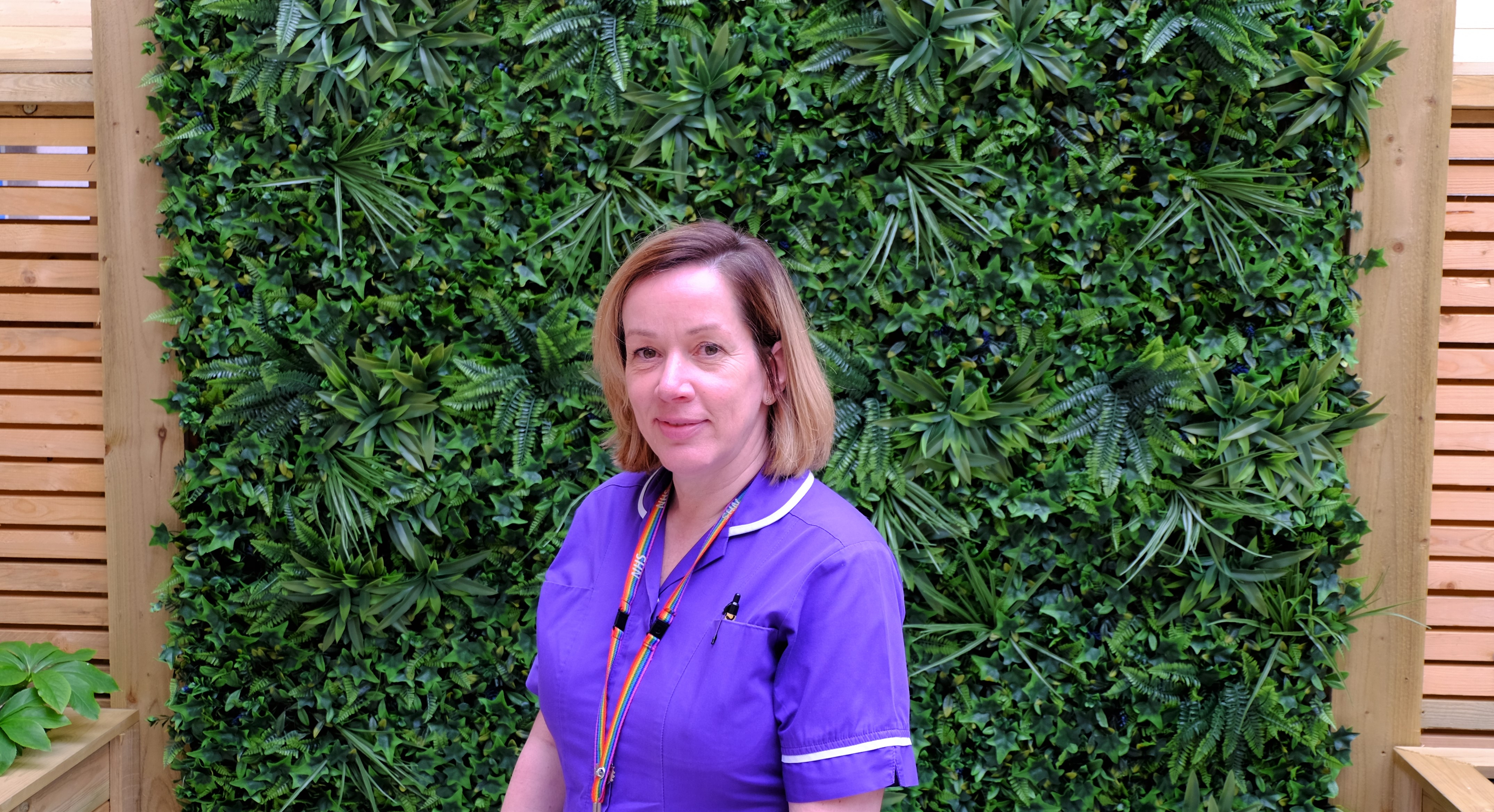 A new report on stroke services in England has highlighted the fact that more than 93% of stroke survivors said they were treated with respect and dignity in services run by University Hospitals of Morecambe Bay NHS Foundation Trust (UHMBT).
A new report on stroke services in England has highlighted the fact that more than 93% of stroke survivors said they were treated with respect and dignity in services run by University Hospitals of Morecambe Bay NHS Foundation Trust (UHMBT).
In the first ever stroke Patient Reported Experience Measures Survey (PREMs), patients said they were satisfied overall with the treatment and care they had received.
This ground-breaking project was made possible by the Stroke Association working in partnership with NHS England. Stroke survivors helped to develop and design the survey which asked about patients’ experiences of stroke care in hospital and the community.
At UHMBT, 56 patients and six carers completed the survey for the period of 16 May to 16 September 2022. The survey covered the whole of UHMBT and was not broken down into individual sites. Patients gave their views on the acute services at Furness General Hospital (FGH) and the Royal Lancaster Infirmary (RLI), and community-based services provided by UHMBT’s Integrated Community Stroke Service. The full UHMBT PREMs report is here.
At a glance – UHMBT Acute Stroke Unit Care
Here are some of the highlights in the order they appeared in the acute questionnaire:
- Thinking about your stay on the acute stroke unit, please state how much you agree with the following statements: The staff treated me with dignity and respect - 95%
- Thinking about your stay on the acute stroke unit, please state how much you agree with the following statements: There was support to express needs and wants e.g. using the toilet, meal and drink options - 77%
- Thinking about your stay on the acute stroke unit, please state how much you agree with the following statements: I was told where I could get further support if I needed it - 85%
- Thinking about leaving the acute stroke unit, please state how much you agree with the following statements: I understood what would happen next after leaving hospital - 78%
- Thinking about leaving the acute stroke unit, please state how much you agree with the following statements: I was told who to contact if I had concerns or questions after leaving hospital - 88%
Many of the Trust’s scores for acute care were higher than the national average, for example, the national score for being treated with respect and dignity was 91% whereas UHMBT scored 95%, and nationally only 72% of patients were told where they could get further support as opposed to 85% of patients at UHMBT. Nationally, 71% of patients said they were told who to contact with concerns after leaving hospital, however at UHMBT 88% of respondents said they were given this key information.
Work is ongoing to further improve UHMBT’s stroke services and, in particular, to ensure that patients are fully involved in planning their therapy and care. The stroke service also has plans underway to increase the amount of psychological support available to patients.
At a glance – Community-based Care
Here are some of the highlights from the community service’s results in the order they appeared in the survey:
- Thinking about your community therapy/treatment, please state how much you agree with the following statements: The staff treated me with dignity and respect - 93%
- Thinking about your community therapy/treatment, please state how much you agree with the following statements: The staff understood how my stroke would affect my life - 78%
- Thinking about your community care, please state how much you agree with the following statements: I knew who to contact if I wanted to ask questions about my stroke and recovery - 84%
- Thinking about your community care, please state how much you agree with the following statements: I knew who to contact if I had urgent worries or concerns about my health - 81%
- Thinking about your community care, please state how much you agree with the following statements: I felt ready to continue my recovery journey on my own - 75%
UHMBT’s scores for community-based care were often higher than the national average, for example, the national score for being treated with respect and dignity in the community was 91% compared to 93% at UHMBT. In terms of being told who to contact with concerns and worries, nationally 74% of respondents said they were given this information as opposed to 81% at UHMBT.
 Yvonne Hastings, Clinical Service Manager for the Integrated Community Stroke Team (ICST) and Service Manager for Speech and Language Therapy (SLT) at UHMBT, said: “A large number of respondents told us that they were cared for with dignity and respect which is gratifying to hear and something that our staff can be proud of.
Yvonne Hastings, Clinical Service Manager for the Integrated Community Stroke Team (ICST) and Service Manager for Speech and Language Therapy (SLT) at UHMBT, said: “A large number of respondents told us that they were cared for with dignity and respect which is gratifying to hear and something that our staff can be proud of.
“The survey was a great opportunity for stroke survivors to have their say, tell us what works well and what can be done better. We are taking a whole-team approach and are working through all of the areas of improvement in the survey.
“One of the initiatives we’re currently trialling in our therapy teams is supporting patients to have a personalised ‘Stroke Passport’ for which will include information on how people like to be communicated with, if they use an iPad, who is caring for them, how the stroke has affected them, their contacts details and such like.
“Other areas of improvement, highlighted in our survey, that patients would like more support and advice to return to work and access psychological support. We are involved in regional working group to address this gap and improving therapy colleagues’ knowledge and skills in these areas”
“There is a lot in the survey that we can learn from and we are fully committed to working with patients, families, carers and the Stroke Association to improve care, treatment, psychological support and involvement in decision-making.”
Miss Jane McNicholas, Chief Medical Officer for UHMBT, said: “I’d like to say a sincere thank you to every patient and carer who took time to complete this important survey and tell us about their experiences. It is gratifying to see that our Trust has scored higher than the national average in many key areas such as patients being treated with respect and dignity and receiving the information they need during their recovery. Our patients’ feedback is hugely valuable and we will act on it to continuously improve our services.”
Click here to view the Stroke PREMs 2022/23 National Report. To view an aphasia friendly version of the key findings from the national report, please click here: PREMs key messages aphasia friendly version. Find out more about the Stroke Association’s services here.
END
Notes for editors: The survey was sent to everyone who had a stroke and was admitted to hospital in England between 16 May 2022 and 16 September 2022. Like other national surveys, it took a 'snapshot' to identify themes. You can view a copy of the national survey here. Nationally, more than 6,600 surveys were returned.
The National report is published and available to view on the Sentinel Stroke National Audit Programme (SSNAP) website (SSNAP - Home (strokeaudit.org), and the Stroke Association website (https://www.stroke.org.uk/prems2022).

